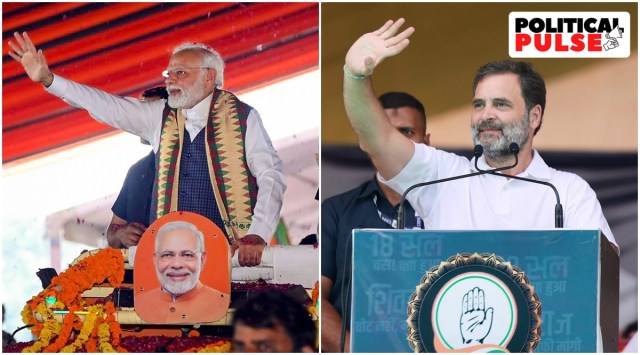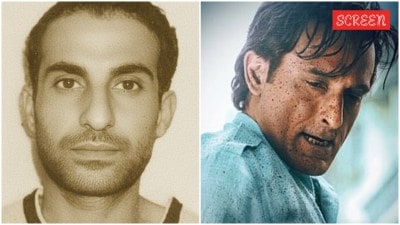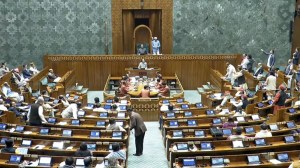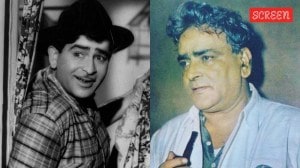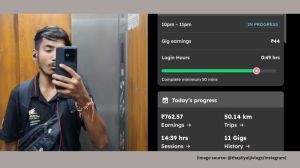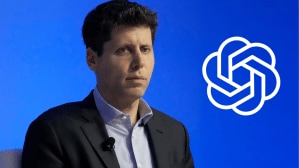THAT THE flavour of the election season is OBCs was underlined yet again Saturday, as Prime Minister Narendra Modi returned to Chhattisgarh for a rally within a fortnight, and Congress leader Rahul Gandhi addressed his first political meeting in poll-bound Madhya Pradesh.
The speeches of both mentioned the recent women’s reservation law, with Modi accusing the Opposition of raising caste only to undermine his government’s achievement, and Rahul asking why the government could not provide OBCs a quota in it.

The Modi rally also showed once again that local leaders would not be the focus of the BJP campaign, with the PM seeking votes in the name of the BJP and its symbol. If at his recent Madhya Pradesh rally, he made no mention of Chief Minister Shivraj Singh Chouhan, at the Bilaspur meeting, former CM Raman Singh got a mention but did not get to speak.
In his speech at Bilaspur, an area that kept the BJP flag up even when it was routed in the 2018 Assembly elections, Modi said the Congress “hates” OBCs and “hates: him because, “despite being an OBC”, he became the PM, a post the party saw as “reserved” for it.
Addressing a rally that was part of the Congress’s ongoing Jan Aakrosh Yatra in Shajapur, MP, Rahul said the BJP was not interested in giving the OBC community “real power” and repeated the demand for a caste census.
The OBC factor
Having let the OBC vote slide away from it almost since Independence, the Congress has lately realised it as a potent tool against the BJP’s Hindutva. Particularly as the BJP plays up the fact that Modi is an OBC, a community that is estimated to form a substantial chunk across states.
In his speech Saturday, to a large crowd, the PM said in a reference to the Congress: “They abuse Modi, using it as an excuse to abuse all OBCs. They hate OBCs… They cannot tolerate the rise of the poor, Dalits, Adivasis and OBCs.”
Story continues below this ad
The PM linked it to the Congress-led Opposition putting up its own candidate for President against Ram Nath Kovind, a Dalit, and Droupadi Murmu, a tribal. This wasn’t because of ideological opposition to the BJP, Modi argued, as the Opposition had fielded an “old BJP leader” — referring to Yashwant Sinha — against Murmu.
As he has been doing since the special session of Parliament last week, Rahul made a mention of the “poor” OBC representation in bureaucracy. “Narendra Modi claims that the BJP is for OBCs, and has MLAs and MPs from the community. I saw the statistics before the speech, first of all the Congress has had three OBC CMs,” he said.
Then, he went on to say that of “the 90 officers who run the country”, only three are OBCs. “The truth is, 90 officers run the government of India… These 90 people decide where the money will go… Now, I want to ask you a question: the BJP has been in power for 10 years, and 90 officers are running the government. Narendra Modi says that you are a part of the government. Tell me, how much involvement do you have in the Budget with these three OBC ? The truth is that OBC officers have 5% representation and control in the entire Budget. Narendra Modiji does not run an OBC government. The work that Narendra Modiji does is given to him by the RSS,” Rahul said.
Demanding a caste census, he added: “When I raise this question, BJP members start interrupting. Narendra Modiji leaves, Amit Shahji says something else, trying to spread hatred between Hindus and Muslims. Brothers and sisters, the biggest issue before India is caste census… The biggest question facing India is how many OBCs there are and what their representation should be.”
Story continues below this ad
Pointing to the socio-economic caste census done by the UPA II government, Rahul said: “Narendra Modiji has all the figures, how many of each caste are in India… They don’t want to tell OBCs how many they are, because they don’t want to give them representation, they don’t want to give them real power. They make your people sit in the Assembly, but then ensure their silence. We want everyone to have representation.”
Reservation to women
Taking the credit for the law providing reservation to women in the Lok Sabha and Assemblies, Modi said the Opposition had only supported it out of “fear” that it might lose women voters otherwise. “Now they are playing a new game. They are trying to divide women on the basis of caste,” Modi said, referring to the Opposition’s demand for an OBC quota within women reservation, exhorting women not to be “deceived”.
Rahul said in his speech: “Narendra Modi, you claim to work for OBCs… Then why haven’t you included OBC reservation within women’s reservation?”
Schemes vs corruption
Rubbing it in that Congress Deputy Chief Minister T S Singh Deo recently said that the Centre had released adequate funds to Chhattisgarh, Modi said it showed that his government had done its part. He accused the Bhupesh Baghel government of still “going slow” on Central schemes for political reasons.
Story continues below this ad
Central schemes comprised a chunk of Modi’s speech, with the PM talking about “drawing energy from the satisfaction of the poor”, highlighting the Ujjwala plan, and referring to the hot-button dispute with the state over procurement of paddy. He said that if voted back to power, the first decision of the BJP state government would be to expedite pucca houses for all the poor.
Rahul spoke about the poll promises fulfilled by Congress governments in other states for women and farmers – mentioning Chhattisgarh, Rajasthan and Karnataka.
He raised the allegations against Gautam Adani, and stressed that his Lok Sabha membership was cancelled because he spoke out against him. “The government should work for the people, not for any organisation or a couple of big industrialists… You have seen Kamal Nath’s work… The work he started, he is going to complete in Madhya Pradesh.”
Adani, he added, “takes money from farmers’ pockets every day”. “Brothers and sisters, 18,000 farmers have committed suicide in 18 years of BJP rule. Three farmers die every day in Madhya Pradesh.”
Story continues below this ad
In my name
Circumventing the tricky territory of regional leaders, Modi said people should not think of Assembly polls in terms of candidates. “You have only one leader, the lotus (the BJP’s party symbol), and only one candidate, the lotus,” he said.
While Raman Singh, present on the dais, did not speak, state BJP chief and Bilaspur MP Arun Sao addressed the gathering in the local dialect as did Rajya Sabha MP Saroj Pandey. Modi made several references to Raman Singh’s tenure as CM though.
Rahul called the MP fight a tussle between ideologies. “On one side is the Congress; on the other, the RSS and BJP. On one side is Gandhi; on the other, Godse. On one side hatred and violence, arrogance; and on the other, love, unity and brotherhood.”

